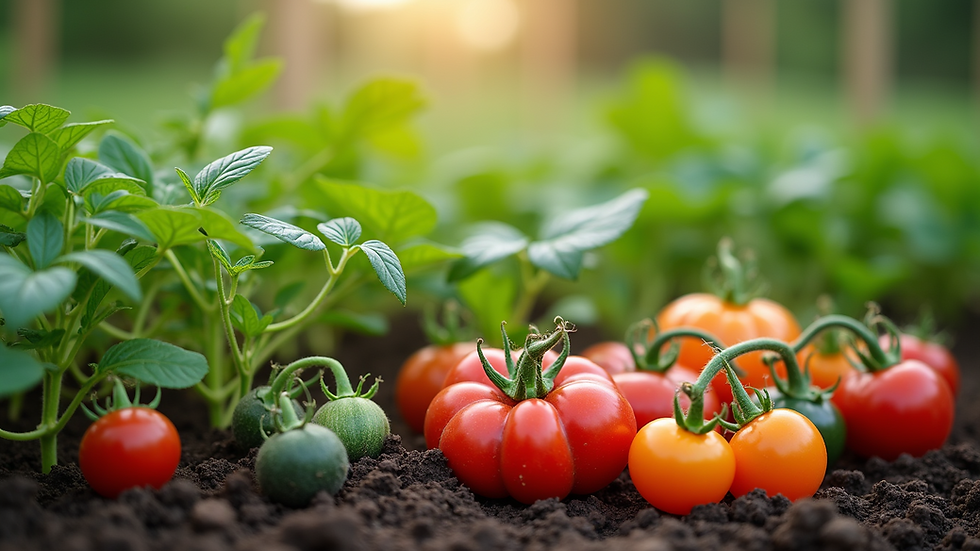Embracing Organic Living: Tips and Trends for September 2025
- BoldCreations ByTJ
- Sep 17
- 3 min read
Bold Creations by TJ 9/16/2025
As we enter September 2025, the organic movement is not just gaining attention; it's becoming a lifestyle choice for many families and individuals. This month, we celebrate Organic September, a time to consider our decisions and discover the advantages of organic living. Whether you are a longtime supporter of organic practices or starting out, this blog post will offer practical tips and insights to enhance your journey toward a more organic way of life.
The Rise of Organic Living
The demand for organic products has seen remarkable growth, with sales reaching $62 billion in the U.S. alone in 2022, up from $15 billion in 2005. This shift stems from increasing awareness about how conventional farming affects our health and the environment. Organic farming prioritizes biodiversity and soil health while minimizing synthetic inputs. As people learn more about the food they consume, the transition to organic living becomes a movement aimed at promoting a healthier planet.

The benefits of organic living stretch beyond food. This lifestyle embraces a holistic view of wellness, including natural skincare, eco-friendly household products, and ethical fashion. By choosing organic, you not only nourish yourself but also support fair practices that benefit farmers and our shared environment.
Tips for Embracing Organic Living
1. Start with Your Plate
Transitioning to an organic diet can be straightforward. Begin by adding organic fruits and vegetables to your meals. For example, consider using organic tomatoes for your salads and sauces. Look for seasonal produce at local farmers' markets, often offering fresher and cheaper options than supermarkets. Did you know that buying organic can reduce your exposure to pesticides by up to 80%?

2. Explore Organic Brands
Countless brands offer organic versions of everyday items, from snacks to cleaning supplies. Take the time to discover these options, and choose ones that resonate with your values. Look for certifications like USDA Organic, which ensures that products meet established organic standards. Some noteworthy brands to consider include Annie's for snacks and Seventh Generation for cleaning products.

3. Grow Your Own
If you have any space available, think about starting your own organic garden. Whether it's a backyard plot or container gardening on a balcony, you can grow herbs, vegetables, and fruits. For instance, growing heirloom tomatoes can be a rewarding experience that gives you control over what you eat. Additionally, homegrown produce can have up to 10 times more nutrients than store-bought options.
4. Educate Yourself
Knowledge equips you to make informed decisions. Spend time reading books, following blogs, or attending workshops that focus on organic practices, nutrition, and sustainable living. For instance, learning about crop rotation can boost your gardening success. The more informed you are, the better choices you can make for yourself and the planet.
5. Connect with Your Community
Engage with local or online groups centered around organic living. Sharing experiences, recipes, and tips with others can motivate and support you on your journey. You may also uncover opportunities for local events, workshops, or volunteer programs that match your interests.
Trends to Watch in Organic Living
In Organic September 2025, some exciting trends are emerging that you should watch out for:
1. Regenerative Agriculture
Regenerative agriculture is not just about sustainability; it aims to restore soil health and biodiversity. This method can lead to more nutritious food and enhanced ecosystems. For instance, farms that practice regenerative techniques report a 40% increase in soil organic matter, leading to improved crop yields over time.
2. Plant-Based Products
The plant-based movement continues to gain traction. Consumers increasingly prefer plant-based diets for health and environmental reasons. As a result, there is a growing variety of organic plant-based products available, from meat alternatives to dairy-free options. Research indicates that adopting more plant-based meals could reduce carbon footprints by 50% or more, depending on individual choices.
3. Sustainable Packaging
With rising concerns about plastic waste, many organic brands are shifting towards sustainable packaging solutions. Seek out products that utilize biodegradable, compostable, or recyclable materials. This shift not only lessens waste but also aligns perfectly with the principles of organic living.
A Call to Action for Organic September
September 2025 is an ideal time to re-evaluate our choices and embrace a lifestyle that values health, sustainability, and ethical practices. Incorporating organic products into our lives can help create a healthier planet for future generations.
Every small effort counts—whether it's adjusting your grocery list, cultivating your own food, or engaging with your community. Let this month inspire you to make intentional choices that align with your values and champion a more organic lifestyle. Together, we can foster meaningful change!










Comments